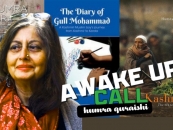Filmmaker and actress Gopi Desai steps on the stage after a long time, in a play that combines the fondness of Gujarati audiences for family dramas, with a story that talks of an issue that affects many urban nuclear families - care of the elderly.
The title of the Gujarati play, Bhartiben Bhula Padya, hints at what it is about - a woman losing her memory. Written by Vinod Sarvaiya and directed by Vipul Mehta with Gopi Desai as the eponymous Bhartiben, the play is quite different from the usual commercial Gujarati stage soap operas.
There is the saas-bahu tension as in every home, but here it’s mostly affectionate. Bhartiben is the superefficient matriarch of the household (the set of the old Amdavad house has some nice detailing), praised for her ability to remember every little thing, while her daughter-in-law Madhuri (Deepali Bhuta) is a ditzy woman obsessed with shopping and sales.

Gopi Desai gives a powerful performance.
Bhartiben’s memory loss starts with small glitches like her turning the wrong way to exit the house, but gets worse when she leaves behind her grandson Hitansh (Keval Gosalia), and forgets her own address. Then she starts forgetting people and regresses into the past, when her husband was alive and her children Nilay (Vinayak Ketkar) and Priti (Kinjal Bhatt) were younger. She does not recognize Madhuri or her son-in-law Pratham (Aniket Tank), and keeps throwing them out of the house.
At first her deterioration is handled with humour - like her mistaking Pratham for the plumber or ordering a cake for her dead husband's birthday party - but then the family doctor (Kapil Bhuta) drops the dreaded Alzheimer’s word. Now the family has to cope with Bhartiben’s incurable ailment, and the responsibility of looking after her falls on Madhuri.
The problems faced by the family of the patient suffering from Alzheimer’s disease are portrayed with sensitivity, but there is really no happy ending here. Still, it is commendable that producers Kaustubh Trivedi and Sanjay Goradia chose to present this subject. Gopi Desai gives a powerful performance, with excellent support from her co-actors.
If there is something that could be avoided is the insulting way (and this is common in Gujarati plays) in which Nilay talks to and about his wife, so that their son also routinely mocks his mother. It seems unfair that the difficult task of being sole caregiver to a dementia patient is expected, or demanded, of the stay-at-home wife. It’s also about time men in Gujarati stage families are taught to keep track of their own wallets, watches, phones and tiffins, instead of having their mothers and wives constantly at their beck and call.

-853X543.jpg)



-173X130.jpg)
-173X130.jpg)

-173X130.jpg)
-173X130.jpg)


